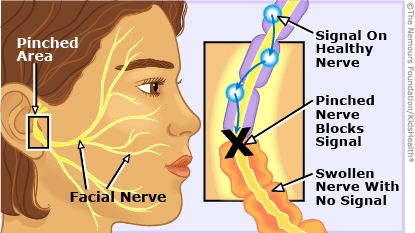- Parents Home
- Para Padres
- A to Z Dictionary
- Allergy Center
- Asthma
- Cancer
- Diabetes
- Diseases & Conditions
- Doctors & Hospitals
- Emotions & Behavior
- First Aid & Safety
- Flu (Influenza)
- Food Allergies
- General Health
- Growth & Development
- Heart Health & Conditions
- Homework Help Center
- Infections
- Newborn Care
- Nutrition & Fitness
- Play & Learn
- Pregnancy Center
- Preventing Premature Birth
- Q&A
- School & Family Life
- Sports Medicine
- Teens Home
- Para Adolescentes
- Asthma
- Be Your Best Self
- Body & Skin Care
- Cancer
- Diabetes
- Diseases & Conditions
- Drugs & Alcohol
- Flu (Influenza)
- Homework Help
- Infections
- Managing Your Weight
- Medical Care 101
- Mental Health
- Nutrition & Fitness
- Q&A
- Safety & First Aid
- School, Jobs, & Friends
- Sexual Health
- Sports Medicine
- Stress & Coping
Bell's Palsy
What Is Bell's Palsy?
Bell's palsy is a sudden weakness of one side of the face. This makes it hard for a person to move their mouth, raise their forehead, wrinkle their nose, or close their eye on that side of the face, which also may droop or look stiff.
Bell’s palsy usually gets better on its own.

What Causes Bell's Palsy?
Each side of the face has a facial nerve that controls its muscles. Bell's palsy happens when the nerve on one side doesn’t work as it should. The facial nerve swells, pressing against bone. This causes weakness or temporary muscle paralysis on that side.
Usually, doctors don’t know exactly why this happens. But some people develop Bell’s palsy after they have an infection, such as:
- HSV-1 (the virus that causes cold sores)
- varicella, the virus that causes chickenpox
- Epstein-Barr (the virus that causes mononucleosis)
- the flu
Other things also can paralyze the facial nerve, such as ear infections, Lyme disease, and trauma to the head or face.
What Are the Signs & Symptoms of Bell’s Palsy?
Bell's palsy tends to happen quickly on one side of the face. Some kids may feel pain or fullness in an ear before the facial weakness starts.
Some kids have only slight weakness. But others might not be able to move that side of their face at all. The face (especially the mouth) seems to droop on the affected side.
Other symptoms include:
- sounds seeming louder than usual in the ear on the affected side of the face
- trouble shutting one eye
- eye dryness
- loss of taste at the front of the tongue
- drooling
Bell's palsy affects only the facial muscles. If other parts of the body are weak or paralyzed, it is not Bell’s palsy.
How Is Bell’s Palsy Diagnosed?
There isn't a specific test to check for Bell's palsy. Doctors diagnose it based on symptoms and an exam. Blood tests and X-rays usually are not needed. Because Lyme disease can cause facial nerve paralysis, doctors may check for it in areas where it’s common.
When symptoms are not typical for Bell’s palsy or the weakness doesn’t get better after a few weeks, doctors might order such tests as:
- computed tomography (CT) scans
- magnetic resonance imaging (MRI)
- electromyography (EMG) to check how well the muscles and nerves are working
How Is Bell’s Palsy Treated?
Bell’s palsy usually goes away as the swelling goes down and the nerve recovers. Doctors might recommend:
- steroid medicines to ease nerve swelling, especially in the first 3 days
- eye drops or ointment to lubricate and protect the eye
- a patch at night to protect the eye
- face exercises to help make muscles stronger
Most kids with Bell’s palsy get completely better within a few weeks. Rarely, some may continue to have some weakness in their face, especially if the paralysis was severe.
How Can Parents Help?
Bell's palsy can be tough for kids because it changes the way they look. Reassure your child that their face will soon return to normal.
If your child is teased, consider talking with teachers, school counselors, and coaches. If your child is comfortable with it, you could to speak to the class, so classmates know why your child looks different. You also can practice with your child some things to say if people ask what's wrong, stare, or say unkind things. Most people will be understanding if you explain that it's a temporary problem that isn't contagious.

© 1995- The Nemours Foundation. KidsHealth® is a registered trademark of The Nemours Foundation. All rights reserved.
Images sourced by The Nemours Foundation and Getty Images.
